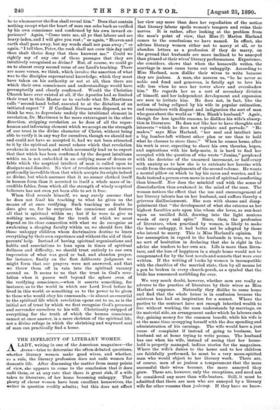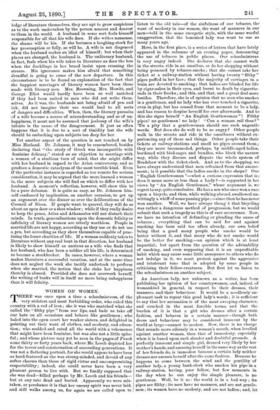THE INFELICITY OF LITERARY WOMEN.
ALADY, writing in one of the American magazines—the Arena—tries to determine the often-debated questions, whether literary women make good wives, and whether, as a rule, the literary profession does not unfit women for domestic life. After discussing the matter from many points of view, she appears to come to the conclusion that it does unfit them, or at any rate that there is great risk, if a wife takes to literature, of her home becoming unhappy. That plenty of clever women have been excellent housewives, the writer in question readily admits; but this does not affect her view any more than does her repudiation of the notion that literary labour spoils women's tempers and ruins their nerves. It is rather, after looking at the problem from the man's point of view, that Miss (I)) Marion Harland comes to the conclusions we have named. In effect, she advises literary women either not to many at all, or to abandon letters as a profession if they do marry, on the ground that husbands are more inclined to be annoyed than pleased at their wives' literary performances. Experience, she considers, shows that when the housewife writes, the marriage in most cases turns out unhappily. According to Miss Harland, men dislike their wives to write because they are jealous. A man, she assures us, "be he never so noble and fond and generous, is fatally apt to love his wife less when he sees her tower above and overshadow him." He regards her as a sort of secondary division of himself, and her independent development and expansion are sure to irritate him. He does not, in fact, like the notion of being eclipsed by his wife in popular estimation, and remembers with disgust and indignation the sort of man who goes about the world as "Mrs. Blank's husband." Agair, though for less ignoble reasons, he dislikes his wife's absorp- tion in literature. He does not like her to have thoughts and interests "which he does not regulate and pervade." "He makes," says Miss Harland, "her soul and intellect into a big lumber-loft without other plan or use than to hold what he chooses to store there." When he comes home, after his work is over, expecting to share his own theories, hopes, and aspirations with his help-mate, it is hard to find her occupied with the question of who wrote "Junius," perplexed with the doctrine of the unearned increment, or half-crazy with anxiety as to how she is to extricate her heroine with credit from the entanglements of the second volume. He wants a mental pillow on which to lay his cares and worries, and he finds instead a person even more in need of spiritual comforting than himself. Nor does the mischief end with the sense of dissatisfaction thus awakened in the mind of the man. The woman notices the effect that the use and encouragement of her literary talents has on her husband, and suffers thereby a grievous disillusionment. She sees with shame and disap- pointment that "the development of what she esteems as her highest faculties acts upon him whom she loves, as sun-heat upon an untilled field, drawing into the light noxious weeds of envy and spite." Since, then, the profession of literature, when practised by women, is likely to make the home unhappy, it had better not be adopted by those who intend to marry. This is Miss Harland's opinion. If her assumption in regard to the husbands is true, we have no sort of hesitation in declaring that she is right in the advice she tenders to her own sex. Life is more than litera- ture, and the loss of happiness in a single home would not be compensated for by the best novels and sonnets that were ever written. If the writing of Looks by women is incompatible with the charities of the married state, then by all means let a pen be broken in every church-porch, as a symbol that the bride has renounced scribbling for ever.
We very much doubt, however, whether men are really so adverse to the practice of literature by their wives as Miss Harland supposes. Naturally they dislike to come home and find that the whole house is in confusion because the mistress has had an inspiration for a sonnet. Where the parties to the contract have not enough inherited wealth to live without working, the man understands by marriage, on its material side, an arrangement under which he labours each day, gaining money for the common benefit, while his wife is at the same time occupying herself with the due spending and administration of his earnings. The wife would have a just cause of complaint if instead of going to business, her husband sat at home trying to write poems. The husband has one when his wife, instead of seeing that her house- hold is properly managed, indites stories for the magazines. Where the wife's duties to the home and to her children are faithfully performed, he must be a very mean-spirited man who would object to her literary work. There are, of course, men of so jealous a temperament that the more successful their wives become, the more annoyed they grow. These are, however, only the exceptions, and need not be considered any more than wife-beaters. Still, it must be admitted that there are men who are annoyed by a literary wife for other reasons than jealousy. If they have no know-
ledge of literature themselves, they are apt to grow suspicious as to the work undertaken by the person nearest and dearest to them in the world. A husband in some sort feels himself responsible for all that his wife does. If she writes nonsense, the shame will be his. If she becomes a laughing-stock for her presumption or folly, so will he. A wife is not disgraced when the husband makes an idiot of himself; but when their places are changed, the husband is. The unliterary husband, in fact, feels when his wife takes to literature as does the hen when the ducklings in her brood insist upon crossing the stream. His ignorance makes him afraid that something dreadful is going to come of the new departure. In this .eircumstance is to be found an explanation of the fact that the happiest marriages of literary women have been those made with literary men. Mrs. Browning, Mrs. Howitt, and George Eliot would hardly have been so well matched if they had been united to men who did not write them- selves. As it was, the husbands not being afraid of pen and ink, did not imagine their use would lead to all sorts of dangers and difficulties. When, then, the literary pursuits of a wife become a source of misunderstanding and so of un- happiness, it must not be assumed that jealousy of the wife's talents is the cause of the disagreement. It just as often happens that it is due to a sort of timidity lest the wife should be embarking upon subjects too deep for her.
Yet another aspect of the question is not touched on by Miss Harland. Dr. Johnson, it may be remembered, besides declaring that "the study of Greek was incompatible with feminine delicacy," stated as an objection to marriage with a woman of a studious turn of mind, that she might differ with her husband in regard to the Arian controversy, and so produce a domestic cataclysm of the most terrible kind. Even if the particular instance is regarded as too remote for serious consideration, it may be argued that the more learned a woman is, the more subjects she will find on which to differ with her husband. A moment's reflection, however, will show this to he a pure delusion. It is quite as easy, as Dr. Johnson him- self confessed by implication, on another occasion, to get up .an argument over the dinner as over the deliberations of the -Council of Nicea. If people want to quarrel, they will do so about an open door or a shut window ; while if they really desire to keep the peace, Arius and Athanasius will not disturb their eninds. In truth, generalisations upon the domestic felicity or -infelicity of literary women are utterly worthless. People in married life are not happy, according as they use or do not use a pen, but according as they show themselves capable of prac- tising the lesser charities of life. If a woman suddenly takes to literature without any real befit in that direction, her husband ..is likely to show himself as anxious as a wife who finds that her husband, who has been a soldier all his life, is determined to become a stockbroker. In cases, however, where a woman makes literature a successful vocation, and at the same time does not neglect the work she tacitly undertook to perform when she married, the notion that she risks her happiness thereby is absurd. Provided she does not overwork herself, the writing of books will in itself no more bring unhappiness than it will felicity.



































 Previous page
Previous page